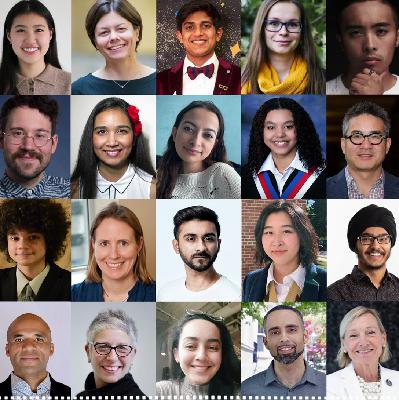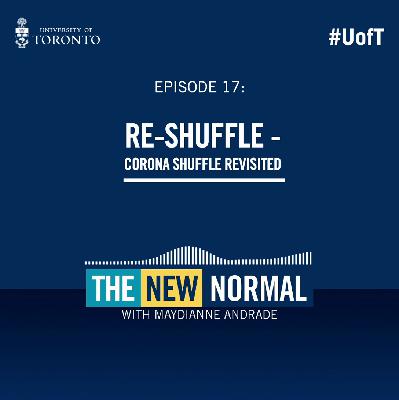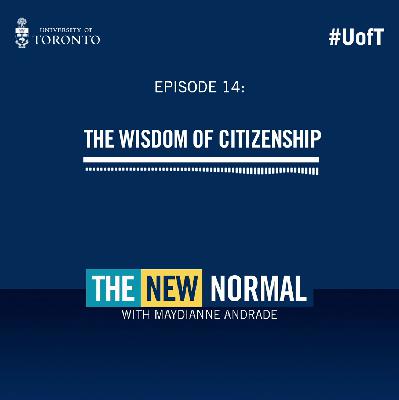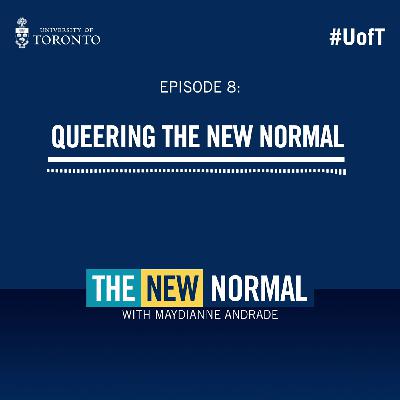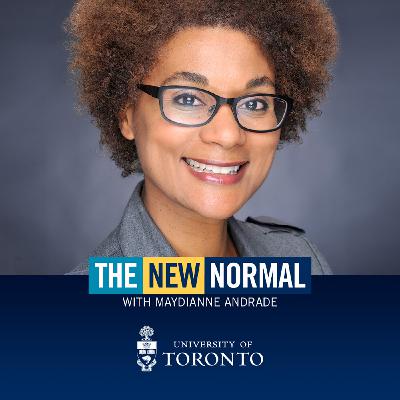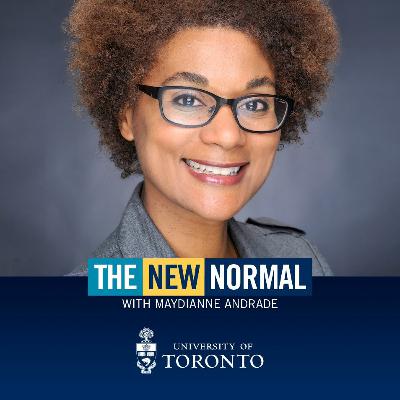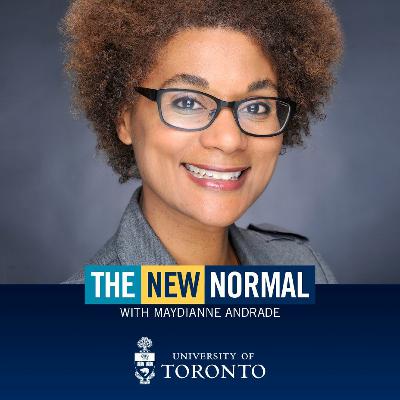Discover The New Normal
The New Normal

The New Normal
Author: University of Toronto
Subscribed: 3Played: 38Subscribe
Share
© All rights reserved
Description
The global pandemic has altered much of our daily lives – school, work, shopping, how we connect with family and friends – and is shaping how we view our future.
“You would think spending the last 20 years teaching evolutionary biology at the University of Toronto might have prepared me for some of this,” says U of T Scarborough professor Maydianne Andrade. “I spend a couple of weeks every year teaching my students about the evolution of viruses. In fact, I have a slide that says this is one of our biggest threats.
“I’m also a behavioural ecologist, which means I understand, or think about, how our evolutionary history interacts with what’s around right now in the current context, to shape our behaviour.
“But none of that helped.”
In a new weekly podcast created in collaboration with a University of Toronto Communications team led by producer Lisa Lightbourn, Andrade – the Canada Research Chair in Integrative Behavioural Ecology and vice-dean of faculty affairs and equity at U of T Scarborough – explores how we’re coping with this “new normal” and what kind of future we’re building in the process.
“You would think spending the last 20 years teaching evolutionary biology at the University of Toronto might have prepared me for some of this,” says U of T Scarborough professor Maydianne Andrade. “I spend a couple of weeks every year teaching my students about the evolution of viruses. In fact, I have a slide that says this is one of our biggest threats.
“I’m also a behavioural ecologist, which means I understand, or think about, how our evolutionary history interacts with what’s around right now in the current context, to shape our behaviour.
“But none of that helped.”
In a new weekly podcast created in collaboration with a University of Toronto Communications team led by producer Lisa Lightbourn, Andrade – the Canada Research Chair in Integrative Behavioural Ecology and vice-dean of faculty affairs and equity at U of T Scarborough – explores how we’re coping with this “new normal” and what kind of future we’re building in the process.
22 Episodes
Reverse
For University of Toronto students Gigi Hoi and Alfonso Ralph Mendoza Manalo, one of the first steps in dealing with anti-Asian racism is having difficult, honest conversations. “Having a space where people can feel safe and share … whatever it is that they're going through,” is crucial says Hoi, a PhD candidate in the department of ecology and evolutionary biology in the Faculty of Arts & Science. Hoi and Manalo are guests on “Scapegoat,” a special two-part episode of The New Normal podcast hosted by Maydianne Andrade. In the episode’s first instalment, Andrade, a professor at U of T Scarborough and Canada Research Chair in Integrative Behavioural Ecology, spoke with Associate Professor Diana Fu and Associate Professor Jooyoung Lee about the history of anti-Asian racism and its devastating impacts. Being able to have a candid conversation about racism is vital whether “you've been on the receiving end of aggressions or you were a bystander and regret that you didn't do anything or you suddenly realize that you have unintentionally caused harm,” Hoi says. “I think it's so important as a first step towards fighting anti-Black, anti-Indigenous and anti-Asian racism.” Manalo, a third-year undergraduate at U of T Scarborough, is completing a work term at the RCMP as an equity, diversity and inclusion policy adviser, where he is working on an anti-racism course for employees. “Sometimes in order for someone's voice to be heard, something tragic has to occur,” Manalo says. “I think for Asian Canadians, it's seeing our elders being targeted in Chinatown, it's seeing law enforcement agencies not adequately responding to hate crimes or understanding that we're scared.” Having a voice at the table can make a difference, he adds. “With this course on anti-racism, we're given the opportunity to make 30,000 employees across the RCMP understand the oppression that Black Canadians, Asian Canadians and Indigenous Peoples face and have been facing here for so long – and how they should respond to that.” The New Normal is created in collaboration with a University of Toronto Communications team led by Lisa Lightbourn. You can listen to the podcast on Spotify or listen on SoundCloud. You can also find it on Apple or listen on Google.
Anti-Asian racism and violence in North America have been called a “shadow pandemic” – one that has intensified over the past year and builds on a long history of discrimination. How, then, can we stop it? “One of the things that I've been trying to promote in the aftermath of the shootings in Georgia is the power that allies and bystanders have,” says Jooyoung Lee, an associate professor of sociology at the University of Toronto. “If you're a witness to harassment in public, just speaking up, just doing something … can have significant effects.” Lee is one of two guests in “Scapegoat,” a special two-part episode of The New Normal podcast hosted by Maydianne Andrade. The second guest is Diana Fu, an associate professor of political science at U of T Scarborough and an expert on U.S.-China relations. “Anti-Asian racism during the pandemic has been called a shadow pandemic and I think that term is very, very powerful,” says Fu. “It's not just that Asians are experiencing the pandemic like everybody else, but, on top of that, we are being beaten, being yelled at, being spit at. All of those things are being experienced on top of experiencing the virus. “And it's also not a recent problem.” Together, Fu, Lee and Andrade, a professor at U of T Scarborough and Canada Research Chair in Integrative Behavioural Ecology, explore the history of anti-Asian racism and its devastating impacts. “Do you know what it feels like to have others act like you have less value than other humans? In Canada, we call it being racialized,” Andrade says. “How do we find solutions? How can we be agents of change?” The New Normal is created in collaboration with a University of Toronto Communications team led by Lisa Lightbourn. You can listen to the podcast on Spotify or listen on SoundCloud. You can also find it on Apple or listen on Google.
For some, it was the last time they remember hugging a friend or a colleague, the last time they were with a class, in a crowd or with a group, the last time they took public transit without thinking about risk. In episode 18 of The New Normal podcast, University of Toronto students, alumni and faculty talk with host Maydianne Andrade about the moment they realized COVID-19 had changed their world – and what they’re most looking forward to when the pandemic ends. “On Friday, March 13th of 2020, I was working in the emergency department and we were overflowing with people – mostly travellers returning and needing or wanting to get tested for COVID,” recalls Erin Bearss, a professor in U of T’s department of family and community medicine in the Temerty Faculty of Medicine and a staff physician in family health medicine and emergency medicine at Mount Sinai Hospital. “I recruited some of my residents to come and help with the swabbing and the overflow, which then led to subsequently the development of a COVID assessment center at Mount Sinai, which has continued to run over the past year.” Recent grad Isheeta Chakrabarti was in Robarts Library. “I was streaming the basketball game,” Chakrabarti recalls. “And suddenly we got a notification saying one of the players had caught COVID.” Andrade, a professor at U of T Scarborough and Canada Research Chair in Integrative Behavioural Ecology, describes life one year later as one in which “hope and longing” are intertwined. What, she asks, are people most looking forward to in the future? “Post-pandemic, I'm most looking forward to just being able to see and hug my grandparents, family and close friends again,” says undergraduate student Abhay Singh Sachal. “The thing I'm most looking forward to is going back home to Alberta and hugging my whole family as soon as I can,” says second-year internal medicine resident Nikita-Kiran Singh. For Professor Joseph Wong, interim vice-president, international, visiting with family also tops the list – but “second thing is, I can't wait to be at a Toronto Raptors game again in the Scotiabank Arena and to be in that live audience and just going crazy.” The New Normal is created in collaboration with a University of Toronto Communications team led by Lisa Lightbourn. You can listen to the podcast on Spotify or listen on SoundCloud. You can also find it on Apple or listen on Google.
One year into the global pandemic, with vaccines on the horizon, The New Normal podcast explores how far we’ve come – by looking back at where we started. In episode 17, host Maydianne Andrade, a professor at the University of Toronto Scarborough and Canada Research Chair in Integrative Behavioural Ecology, revisits the debut episode of the podcast, which was recorded shortly after the pandemic abruptly changed our lives. “No one was talking to each other,” Andrade observes. “It was almost like we were afraid that conversation would spread the virus. It was almost like we didn't know what to do or say in this strange new world.” The New Normal is created in collaboration with a University of Toronto Communications team led by Lisa Lightbourn. You can listen to the podcast on Spotify or listen on SoundCloud. You can also find it on Apple or listen on Google.
Did the printing press transform the world and lead to freedom of information – or is that a myth promoted by white, Western society? In episode 16 of her podcast, The New Normal, Professor Maydianne Andrade explores the origin stories of societies and nations with Alexandra Gillespie, a professor of English and vice-president and principal of the University of Toronto Mississauga. “Societies and nations have origin stories. Their histories are used to build justification for present-day structures,” says Andrade, Canada Research Chair in Integrative Behavioural Ecology. “But what if those stories are myths?” Western Europe’s development of printing technology needs to be viewed alongside “belligerent, violent colonialism and the enslavement of African peoples in particular – and the way that those two things lead to an extraction of wealth from the whole globe to Western Europe,” Gillespie says. “And what that means is that Western Europe gets to tell its story about printing. Not just tell its story about printing, but actually it gets to take its technology of printing and spread it around the whole world.” The result is a “kind of myth of enlightenment, of progress, of Western triumph.” But was it Western technology and inventions that gave its societies’ power – or, as Gillespie asks, “Was it the wealth that we were extracting from other parts of the world that actually gave us this power?” The episode is the latest in a series of instalments that feature Andrade in conversation with university leaders. In episode 14, she interviewed Professor Wisdom Tettey, vice-president and principal of U of T Scarborough. In episode 15, she spoke with U of T President Meric Gertler. The New Normal is created in collaboration with a University of Toronto Communications team led by Lisa Lightbourn. You can listen to the podcast on Spotify or listen on SoundCloud. You can also find it on Apple or listen on Google.
COVID-19 has disrupted and changed our lives – and our ideas about how we want to live. When the pandemic ends, what changes will we want to keep? What kind of cities will we build? In episode 15 of her podcast, The New Normal, Professor Maydianne Andrade explores these and other questions with Professor Meric Gertler, president of the University of Toronto. “We are used to thinking of cities as static, solid entities and yet they aren't,” says Andrade, Canada Research Chair in Integrative Behavioural Ecology. “They contract, they grow and they evolve.” A professor of geography and planning and a renowned expert on cities, President Gertler notes the pandemic has sparked some innovations that improve the quality of life – from the appropriation of car lanes for bicycles to adding express buses in neighbourhoods where people must travel to work every day. “The quality and the frequency of public transit service [in those communities] was just way below standard and was forcing people to get onto overcrowded buses, which imperiled their health,” President Gertler says. “We've seen the rollout of these kinds of pretty low-tech innovations that have challenged the status quo really quickly.” Those are the kinds of changes “we’ll want to hang on to,” President Gertler says. But the pandemic has also “accelerated and accentuated” income inequality and the vulnerability of racialized communities and neighbourhoods, he says. How then, Andrade asks, “do we solve the entrenched challenges of equity in our city?” “We have a role to play in documenting these inequalities, these trends, analyzing them, understanding them and helping policymakers and the lay public understand the existence of these problems and their roots, but also to help devise policy tools to address these challenges,” President Gertler says. The episode is the latest in a series of instalments that feature Andrade in conversation with university leaders. In episode 14, she interviewed Professor Wisdom Tettey, vice-president and principal of U of T Scarborough. In episode 16, she will speak with Professor Alexandra Gillespie, vice-president and principal of U of T Mississauga. The New Normal is created in collaboration with a University of Toronto Communications team led by Lisa Lightbourn. You can listen to the podcast on Spotify or listen on SoundCloud. You can also find it on Apple or listen on Google.
What does a more inclusive society look like – and what are the responsibilities we hold as citizens when it comes to building one? In the latest episode of her podcast, The New Normal, Professor Maydianne Andrade explores these and other questions with Professor Wisdom Tettey, vice-president and principal of the University of Toronto Scarborough. It’s the first in a series of episodes that will feature Andrade in conversation with university leaders. Upcoming instalments include a conversation with President Meric Gertler and a conversation with Professor Alexandra Gillespie, vice-president and principal of U of T Mississauga. “The pandemic has shown us how interconnected we are,” says Andrade, Canada Research Chair in Integrative Behavioural Ecology. But can that offset “the lasting effects of Trumpism, the laying bare of selfishness?” For Tettey, a political scientist and leading researcher on African diaspora, politics and media, a crucial first step is recognizing inequities in our society and confronting difficult truths about their causes. Only then can we talk about “how to heal by making one another better,” he says. “Those are conversations that are sometimes uncomfortable, but are necessary.” For example, Tettey says the phrase “that’s not who we are” has dominated recent conversations around white supremacy and fear. “It actually is who we are,” Tettey says. “This is fundamental to who we are. It goes to my point about recognition as a fundamental prerequisite for making the changes that are necessary.” To build a more inclusive society, he says, we must “have the humility to challenge ourselves and to be willing to let go of things that have no basis,” so that we can learn and grow. “It takes all of us doing our part and continuing to challenge ourselves, to learn, to reach out, to get into spaces that we're not comfortable with.” The New Normal is created in collaboration with a University of Toronto Communications team led by Lisa Lightbourn. You can listen to the podcast on Spotify or listen on SoundCloud. You can also find it on Apple or listen on Google.
The pandemic has shone a light on the systemic and structural oppression of vulnerable populations, says the University of Toronto’s Kimberley Tull. “There's been so much revealed,” says Tull, the director of community and learning partnerships and access pathways at U of T Scarborough. “Who has and hasn't. Who can and can't be safe. Who can breathe and who cannot. What does it mean to be vulnerable? What does it mean to be on the margins?” In episode 13 of The New Normal podcast with Maydianne Andrade, guest host Tull talks about the challenges facing vulnerable populations with Janet Mason, assistant professor, teaching stream, at the Munk School of Global Affairs & Public Policy and Justin Rhoden, a third-year student at U of T Scarborough. “Toronto used to be a city where people who were well-off lived a block or whatever away from people who worked. It used to be a very integrated city,” Mason says. But these days, she says, poverty and a lack of access to social supports and services are increasingly concentrated in particular neighbourhoods – and the pandemic has highlighted that divide. “You constantly hear this discourse of ‘We're all in this together,’” says Rhoden. “I don't know who ‘we’ and ‘all’ is, but we're definitely not all in this together, you know?” At the same time, he says he has hope that people will take this moment to reflect on how to build a better future. “There is hope in the fact that people will mobilize, that people will organize,” Rhoden says. “I also find hope within communities – local and global communities.” It’s important that society doesn’t simply “go back to normal” once the pandemic ends, Tull says. “The new normal needs for us as a society to own these inequities and be accountable to each other and how we care for one another and how we collectively dismantle the systems and structures that support and enable these oppressions.” The New Normal is created in collaboration with a University of Toronto Communications team led by Lisa Lightbourn. You can listen to the podcast on Spotify or listen on SoundCloud. You can also find it on Apple or listen on Google.
When the pandemic hit, Fiona Rawle – a professor of biology and the associate dean, undergraduate at the University of Toronto Mississauga – was quick to analyze the challenges of remote teaching and learning and determine that a new approach was needed. “Students, faculty, staff, and teaching assistants are all under more stress than usual,” Rawle says. “If ever there was a time for a pedagogy of kindness, it's now.” Rawle designed and co-led a series of workshops to help faculty members better connect with students and provide them with the necessary support. The goal is to create “a culture of communication, flexibility, understanding and collaboration,” she says. “We need to foster dialogue and learn about the student experience. We need to purposefully bridge the professor-student divide.” In episode 12 of The New Normal podcast with Maydianne Andrade, guest host Rawle speaks with undergraduate students Nicole Caetano and Faarea Hussain about the challenges they’re facing during the pandemic. She also speaks with Ann Gagné, an educational developer at the Robert Gillespie Academic Skill Centre at U of T Mississauga. “I believe that a pedagogy of kindness is so important right now because we, of course, are living and working through rather traumatic times,” says Gagné. “Once we know this, then we can move more towards a trauma-informed approach that has kindness, that has safety and that really builds a relationship of trust between the learner and the instructor, but also a relationship of trust between the students themselves. In the end, Rawle says, kindness helps to foster connection. “We know that the more connected our students feel, then the better they learn. We want students to know that they are more than a number.” The New Normal is created in collaboration with a University of Toronto Communications team led by Lisa Lightbourn. You can listen to the podcast on Spotify or listen on SoundCloud. You can also find it on Apple or listen on Google.
What is it like to take part in classes at the University of Toronto from your home in southern Brazil? How does it feel, as a student from Cameroon, to witness anti-Black racism in North America? The New Normal, a podcast hosted by Professor Maydianne Andrade, vice-dean faculty affairs, equity and success, at U of T Scarborough and a Canada Research Chair in Integrative Behavioural Ecology, explores how the COVID-19 pandemic has affected our daily lives. In episode 11, Andrade turns the microphone over to guest host Joe Wong, the Ralph and Roz Halbert professor of innovation at the Munk School of Global Affairs & Public Policy, and U of T’s interim vice-president, international. Wong is joined by three students: Atharv Agrawal, from Mumbai, India, Ana Meleti from Londrina, Brazil and Lesley Sipaka, originally from Cameroon – as they reflect on life during the pandemic, being inspired by those who stand against anti-Black racism and finding ways to have fun. “I'm living the Canadian dream,” says Agrawal. “It's the American dream plus ... a little bit of humanity. And more maple syrup.” The New Normal is created in collaboration with a University of Toronto Communications team led by Lisa Lightbourn. You can listen to the podcast on Spotify or listen on SoundCloud. You can also find it on Apple or listen on Google.
Over the past four months, Maydianne Andrade, vice-dean faculty affairs, equity and success, at the University of Toronto Scarborough and a Canada Research Chair in Integrative Behavioural Ecology, has used her podcast, The New Normal, to explore how the COVID-19 pandemic has affected our daily lives. But in episode 10 of the podcast, Andrade and producer Lisa Lightbourn discuss how the show took on a life of its own, venturing into reflections on larger problems in society. “Equity is a big part of my life and my work, but I thought that this show would just be about, I don’t know – shopping, how we walk down the sidewalk,” Andrade says. The podcast did indeed cover topics ranging from the awkwardness of grocery-shopping during a pandemic to the challenges of explaining the situation to kids and the joy of spontaneous musical performances on balconies. But it also took on pressing matters of equity and social justice, including the killing of George Floyd and the broader Black Lives Matter movement. “We’re still trying to figure out what a new normal will be, and it’s not going back, right?” Lightbourn says in the episode. “We don’t want to go back, necessarily, to this world where people had blinkers on about equity, where we thought about profit more than people,” Andrade says. “There’s all these different aspects of how we’re thinking about people and our neighbours now that we want to continue. We just have to figure out what it looks like as we move through this.” The New Normal is created in collaboration with a University of Toronto Communications team led by Lightbourn. You can listen to the podcast on Spotify or listen on SoundCloud. You can also find it on Apple or listen on Google.
Toronto’s streets have seen fewer cars during the pandemic as the city closed some major roads and expanded the cycling network. Now, there more walkers, cyclists and people sitting at café tables. Is this what a more livable, equitable city looks like? “Like many cities, Toronto has figured out ways to give people space to move in the outdoors while respecting physical distancing, which involve quieting down the streets to reduce traffic volume and expanding the cycling network,” says Professor Maydianne Andrade in episode nine of her podcast, The New Normal. “ActiveTO encourages people to move in ways that used to feel vulnerable when the city streets were dense with traffic.” In “Quiet Streets,” Andrade, a Canada Research Chair in Integrative Behavioural Ecology and the University of Toronto Scarborough’s vice-dean of faculty affairs and equity, talks with Shawn Micallef, a lecturer in the Faculty of Arts & Science and the co-owner and senior editor of Spacing magazine, and alumna Léa Ravensbergen. Ravensbergen, who graduated with a PhD in geography and planning in 2019, says that, for some time, “we've been thinking about using our streets differently and imagining our streets differently and having more livable, people-centered approaches to designing our cities.” Will the pandemic help bring about that kind of change more permanently? “Maybe our movements, our desires to move, need to be more of a central piece in how we design our city and make it a humane place to live,” Andrade says. The New Normal is created in collaboration with a U of T Communications team led by producer Lisa Lightbourn. You can listen to the podcast on Spotify or listen on SoundCloud. You can also find it on Apple or listen on Google.
What can you learn from equity-deserving groups? How to be resilient? How to thrive – even in an environment that doesn’t affirm your right to existence? What are the challenges, achievements and opportunities for the queer community? These are some of the questions explored by Maydianne Andrade, a Canada Research Chair in Integrative Behavioural Ecology and the University of Toronto Scarborough’s vice-dean of faculty affairs and equity, in “Queering The New Normal,” episode eight of her podcast, The New Normal. Andrade’s guests this week are: Professor Shelley Craig of the Factor-Inwentash Faculty of Social Work, a Canada Research Chair in Sexual & Gender Minority Youth and the project director of INQYR (International Partnership for Queer Youth Resilience) Professor Jessica Fields, chair of the department of health and society at U of T Scarborough and the lead for Toronto COVID-19 Action Fund proposal, Impact of COVID-19 on the mental health and vulnerability of sexual and gender minorities living in Toronto Poet and alumna Victoria Mbabazi, who graduated in June and will begin her master’s degree in creative writing at New York University this fall “What really strikes me from talking to young people is that when we kind of think, ‘Oh, things are pretty good now’ – they're not coming from, ‘Things are pretty good now.’ They're coming from, ‘Here's how it actually should be,’” Andrade says. The New Normal is created in collaboration with a University of Toronto Communications team led by producer Lisa Lightbourn. You can listen to the podcast on Spotify or listen on SoundCloud. You can also find it on Apple or listen on Google.
After months of a global pandemic and weeks of protests against anti-Black racism and police brutality, are we at a crossroads? “It feels like we are at a critical moment,” says Maydianne Andrade, a Canada Research Chair in Integrative Behavioural Ecology and the University of Toronto Scarborough’s vice-dean of faculty affairs and equity. “Will we choose the path that is more challenging but more just? In episode seven of her podcast, The New Normal, Andrade is joined by Joe Wong, the Ralph and Roz Halbert Professor of Innovation at U of T’s Munk School of Global Affairs & Public Policy and the founder and principal investigator for the REACH Alliance. She is also joined by alumna and activist Noura Al-Jizawi, who endured torture in Syria before finding a new home in Canada, helped by the Munk School’s Citizen Lab and the Scholars at Risk program. Now a research assistant at Citizen Lab, Al-Jizawi is also an alum of the Reach Alliance. The New Normal is created in collaboration with a University of Toronto Communications team led by producer Lisa Lightbourn. You can listen to the podcast on Spotify or listen on SoundCloud. You can also find it on Apple or listen on Google.
The University of Toronto’s Dr. Onye Nnorom, the Black health theme lead for the Faculty of Medicine’s MD program and the equity, diversity and inclusion lead for the department of family and community medicine, is a guest on Professor Maydianne Andrade’s weekly podcast, The New Normal. The second instalment of a special two-part episode, titled “Enough,” explores the intergenerational impact and trauma of anti-Black racism and violence through scholarly perspectives and personal experiences. Andrade, a Canada Research Chair in Integrative Behavioural Ecology and the U of T Scarborough’s vice-dean of faculty affairs and equity, is also joined by Julius Haag, an assistant professor, teaching stream, in U of T Mississauga’s department of sociology and an expert in policing, youth justice, racialization and criminalization, recent graduate Dorian Grey, a mentor for Black high school youth and volunteer with the Imani Academic Mentorship program – and by Andrade’s 17-year-old daughter, Lily. The New Normal is created in collaboration with a University of Toronto Communications team led by producer Lisa Lightbourn. You can listen to the podcast on Spotify or listen on SoundCloud. You can also find it on Apple or listen on Google. Members of the U of T community who need support are encouraged to contact the Anti-Racism and Cultural Diversity Office and the equity, diversity and inclusion offices at U of T Scarborough and U of T Mississauga. To learn more about anti-Black racism: City of Toronto anti-Black racism community resources (https://www.toronto.ca/community-people/get-involved/community/toronto-for-all/anti-black-racism-2/) City of Toronto anti-Black racism action plan (https://www.toronto.ca/legdocs/mmis/2017/ex/bgrd/backgroundfile-109127.pdf) Ontario’s anti-racism plan (https://www.ontario.ca/page/ontarios-anti-racism-strategic-plan) Broadbent Institute policy proposals to tackle anti-black racism (https://www.broadbentinstitute.ca/bold_policy_proposals_to_tackle_anti_black_racism) Feeling distressed? Find someone to talk to right now – and if there is an immediate risk, call 911. (https://www.studentlife.utoronto.ca/feeling-distressed) Students can speak to a trained crisis worker at any hour of the day. U of T My SSP for students: call 1-844-451-9700 or download the app at the Apple App Store or Google Play. Immediate counselling support is available in 35 languages and ongoing support in 146 languages. Other 24-7 supports available to students include: Good 2 Talk Student Helpline 1-866-925-5454. Professional counselling, information and referrals for mental health, addictions and well-being. (https://good2talk.ca/) Gerstein Crisis Centre 416-929-5200 (http://gersteincentre.org/) Distress Centres of Greater Toronto 416-408-HELP (4357) (https://www.torontodistresscentre.com/408-help-line) The Centre for Addiction and Mental Health at 250 College Street Anishnawbe Health Toronto Mental Health Crisis Line 416-360-0486 (http://aht.ca/) The following services are available to students on all three campuses: St. George campus: Health and Wellness Centre (416-978-8030), located at Koffler Student Services (https://www.studentlife.utoronto.ca/hwc) U of T Scarborough: Health & Wellness Centre 416-287-7065 (https://www.utsc.utoronto.ca/hwc/health-wellness-centre) U of T Mississauga: Health & Counselling Centre 905-828-5255 (https://www.utm.utoronto.ca/health/mental-health) Faculty and staff have access to 24-7 support through: The Employee & Family Assistance Program (EFAP), offered through Homewood Health, online and by phone at 1-800-663-1142 (http://benefits.hrandequity.utoronto.ca/efap/)
This episode explores the intergenerational impact and trauma of anti-Black racism and violence through the scholarly perspectives and personal experiences of Andrade, Canada Research Chair in Integrative Behavioural Ecology and the University of Toronto Scarborough’s vice-dean of faculty affairs and equity, and her guests: U of T Scarborough Assistant Professor Mark Campbell, of the department of arts, culture and media, an expert in hip hop and the music of Black communities, and Assistant Professor, Teaching Stream, Julius Haag of U of T Mississauga’s department of sociology, an expert in policing, youth justice, racialization and criminalization. “There are 40 different cities where people are violating curfew to demonstrate their protests, you know, and honour the life of George Floyd,” Campbell says. “So I'm hoping that this is the moment because I won't see another moment like this in my lifetime.” Hosted by Maydianne Andrade, The New Normal is created in collaboration with a University of Toronto Communications team led by producer Lisa Lightbourn. Those who need support are encouraged to contact the Anti-Racism and Cultural Diversity Office and the equity, diversity and inclusion offices at U of T Scarborough and U of T Mississauga. Read more here: https://www.utoronto.ca/news/new-normal-podcast-releases-first-instalment-two-part-episode-anti-black-racism Subscribe to this podcast on your favourite platform Apple Podcasts: https://pcr.apple.com/id1518270454 Spotify: https://spoti.fi/2MP6HE2 Google Podcasts: https://bit.ly/2BWK5Pz
Chika Oriuwa, valedictorian of the Faculty of Medicine, talks with Professor Maydianne Andrade a Canada Research Chair in Integrative Behavioural Ecology and U of T Scarborough’s vice-dean of faculty affairs and equity, in episode five of The New Normal. The weekly podcast, hosted by Andrade and created in collaboration with a University of Toronto Communications team led by producer Lisa Lightbourn, also features undergrad Isheeta Chakrabarti and Lily Mason, Andrade’s 17-year-old daughter.
In episode four of her podcast, The New Normal, Maydianne Andrade – who is a Canada Research Chair in Integrative Behavioural Ecology and U of T Scarborough’s vice-dean of faculty affairs and equity – talks with some of her students and with members of her own family to see how they’re coping with distancing and uncertainty. The New Normal is a weekly podcast hosted by Andrade and created in collaboration with a University of Toronto Communications team led by producer Lisa Lightbourn.
Episode three of The New Normal – a weekly podcast hosted by Maydianne Andrade and created in collaboration with a University of Toronto Communications team led by producer Lisa Lightbourn – looks at how people are coming together during the pandemic. Andrade speaks with sociologist and associate professor Erik Schneiderhan of University of Toronto Mississauga about our need to connect and whether, as Schneiderhan says, “we'll be a little kinder, a little more open, a little more understanding” with each other when the crisis ends. Producer: Lisa Lightbourn Host & Writer: Maydianne Andrade
In the second episode of her weekly podcast, The New Normal, Maydianne Andrade – who is a Canada Research Chair in Integrative Behavioural Ecology and U of T Scarborough’s vice-dean of faculty affairs and equity – introduces listeners to Professor Katherine Larson. The chair of the English department at U of T Scarborough, Larson is also a singer. Her husband, Lawrence Wiliford, is a classical tenor singer and their four-and-a-half-year-old daughter, Lyra, sings and plays violin. Producer: Lisa Lightbourn Host & Writer: Maydianne Andrade




